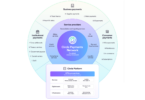Today it was announced that Russia’s Alfa-Bank and the UAE’s First Abu Dhabi Bank (FAB) are joining CLSNet, the foreign exchange bilateral payment netting system for emerging currencies. The solution was initially built with IBM using the Hyperledger Fabric enterprise blockchain.
CLSNet is available for 120 currencies, whereas the core CLSSettlement solution is only available for the 18 most highly traded currencies and typically processes $5.5 trillion of payments daily. The new solution has been adopted by Actinver, Bank of America, Bank of China (Hong Kong), BNP Paribas, Citibank, Goldman Sachs, Intesa Sanpaolo, J.P. Morgan and Morgan Stanley.
“Our participation in the service will be integral to our ability to improve operational efficiency and reduce risk for the currencies that we trade, particularly the Russian ruble, which is not currently eligible for settlement in CLS,” said Andrew Chulack, Deputy Chairman of Alfa-Bank.
Turning to FAB, early last week FAB announced it was the first UAE bank to join CLSNet under a testing and trial agreement.
CLSNet is a bilateral system without CLS sitting in the middle of the settlement process. Instead of settling every transaction individually, automated netting reduces the amount that has to be paid, leaving more funds available for other purposes. Apart from this increased liquidity, it also reduces counterparty risk and the errors and costs of manually calculating netting or settling a higher volume of transactions. Plus, the cost of settling emerging market currencies tends to be relatively high.
As with many other market solutions, some users prefer to connect via APIs. “CLSNet is built on a distributed ledger technology (DLT) platform and clients will benefit from the robust design of this permission based ledger,” said a CLS spokesperson. “It was always CLS’s intention to launch the service in phases and we will continue to work with clients to ensure that we can provide sufficient flexibility to accommodate multiple connectivity models, including DLT, based on the market demand.”
A month ago, CLS announced that the solution was integrated with Finastra’s Fusion Confirmation Matching Service. In terms of the roadmap, CLS is exploring new functionality for liquidity optimization and payment certainty.
Back in July 2018, IBM and CLS announced it was working on a bigger blockchain project, LedgerConnect, which aimed to host multiple shared services. These included KYC, sanctions screening, collateral management, post-trade processing for derivatives and reconciliation. However, since then, there has been no news.
A CLS spokesperson told Ledger Insights via email that the “output of the LedgerConnect POC (proof of concept) with IBM has provided CLS with insights about how a DLT-based networked infrastructure could work in a multi-vendor environment. We are leveraging these insights into our product strategies going forward”.
Update: this article has been significantly updated, including the addition of CLS quotes.






